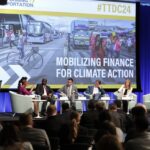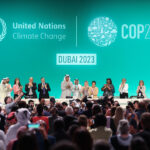Posts tagged with 'ghg emissions'
In the stylish Grünerløkka neighborhood in Oslo, construction workers are busy rehabilitating Sophies Minde, an old medical clinic, into a new nursery school and maternal health center. Tidy piles of building materials along the perimeter of the construction site wait ...

In March 2024, the inaugural Buildings and Climate Global Forum convened more than 1,000 participants to spur action towards built environment decarbonization and resilience. The first-of-its-kind forum was welcome, as the sector needs a shakeup. The big issue on the table was ...

By early 2025, countries are due to unveil new national climate commitments under the Paris Agreement, known as nationally determined contributions (NDCs). These commitments form the foundation of international climate action, establishing emissions-reduction targets and other measures that countries promise ...

Like many parts of Africa, motorcycles are the most popular form of transportation among Rwanda’s 13.3 million people. Whether they’re commuting to work or school, transporting jugs of water from the local taps or just running everyday errands, people on ...

At COP28, global climate leaders congregated in Dubai for the annual opportunity to review countries’ progress on emissions reductions and to increase climate ambition. One of the conference’s focal points was how to rapidly and equitably transition away from fossil ...

The adoption of any new technology involves some degree of adaptation, and battery electric buses (e-buses) are no exception. After decades of experience with diesel vehicles, cities and operators need to understand the technical and operational specifications of e-buses to ...

If a picture can tell a whole story, then the image below of an intersection in Dar es Salaam, Tanzania, shows the past, present and future of global transformation in the transport sector. During Transforming Transportation 2024, which focused on ...

As electric school buses hit the road across the United States, it’s important for school districts and school transportation providers to prepare for how these clean-running buses will perform in different climates. The good news? Electric school buses are tested ...

Last year shattered global heat records. The world witnessed the effects of rising temperatures in the form of devastating wildfires, severe flooding, extreme heatwaves and more. Poor countries and communities who have contributed the least to causing the climate crisis ...

India aims to reduce the emissions intensity of its economy by 45% by 2030, compared to 2005 levels, and to achieve net-zero emissions by 2070. The country can’t achieve either goal without a radical transformation in its buildings and construction sector, which was responsible for around 17% of the nation’s ...

By David Waskow, Jennifer Layke, Nate Warszawski, Preety Bhandari, Gabrielle Swaby, Natalia Alayza, Jamal Srouji, Mario Julien Díaz, Edward Davey, Rogier van den Berg, Roman Czebiniak, Paige Langer and Nathan Cogswell on December 19, 2023
The COP28 climate talks began with a new fund to address the increasingly severe losses and damage vulnerable countries face from climate impacts and concluded with the first international agreement to tackle climate change’s main driver: fossil fuels. Those bookends to the Dubai summit ...

Public transport is one of the best, most cost-effective solutions available to address today’s climate and development challenges. Buses and trains can reduce greenhouse gas (GHG) emissions by up to two-thirds per passenger, per kilometer compared to private vehicles. The UN’s latest ...

In the Seychelles archipelago in east Africa, flooding and erosion caused by rising sea levels pose an imminent threat to the country’s many low-lying islands. At the same time its mangrove forests, which serve as a vital buffer against these ...

By Sophie Boehm, Clea Schumer, Emma Grier, Louise Jeffery, Judit Hecke, Joel Jaeger, Claire Fyson, Kelly Levin, Anna Nilsson, Stephen Naimoli, Joe Thwaites, Katie Lebling, Richard Waite, Jason Collis, Michelle Sims, Neelam Singh, William Lamb, Sebastian Castellanos, Anderson Lee, Marie-Charlotte Geffray, Raychel Santo, Mulubrhan Balehegn, Michael Petroni and Maeve Masterson on November 20, 2023
Today’s climate change headlines often seem at odds with each other. One day, it’s catastrophic wildfires wreaking havoc around the world; the next, it’s an optimistic piece on the rapid scale-up of solar and wind power. Taken together, such stories ...

Public vehicle fleets, which include everything from city buses and school buses to garbage trucks and law enforcement vehicles, make up a significant share of traffic on U.S. roads. There are 645,000 vehicles in the federal fleet, 500,000 in state fleets across the ...


























